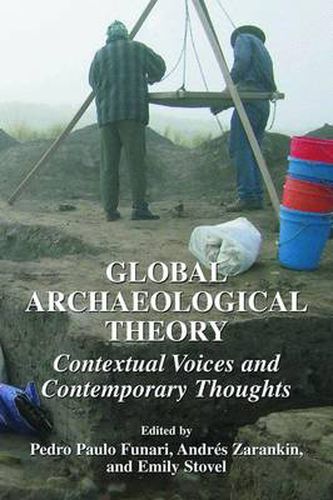Readings Newsletter
Become a Readings Member to make your shopping experience even easier.
Sign in or sign up for free!
You’re not far away from qualifying for FREE standard shipping within Australia
You’ve qualified for FREE standard shipping within Australia
The cart is loading…






This title is printed to order. This book may have been self-published. If so, we cannot guarantee the quality of the content. In the main most books will have gone through the editing process however some may not. We therefore suggest that you be aware of this before ordering this book. If in doubt check either the author or publisher’s details as we are unable to accept any returns unless they are faulty. Please contact us if you have any questions.
Archaeological theory has gone through a great upheaval in the last 50 years - from the processual theory, which wanted to make archaeology more scientific to post-processual theory, which understands that interpreting human behavior (even of past cultures) is a subjective study. This subjective approach incorporates a plurality of readings, thereby implying that different interpretations are always possible, allowing us to modify and change our ideas under the light of new information and/or interpretive frameworks. In this way, interpretations form a continuous flow of transformation and change, and thus archaeologists do not uncover a real past but rather construct a historical past or a narrative of the past.
Post-processual theory also incorporates a conscious and explicit political interest on the past of the scholar and the subject. This includes fields and topics such as gender issues, ethnicity, class, landscapes, and consumption. This reflects a conscious attempt to also decentralize the discipline, from an imperialist point of view to an empowering one. Method and theory also means being politically aware and engaged to incorporate diverse critical approaches to improve understanding of the past and the present.
This book focuses on the fundamental theoretical issues found in the discipline and thus both engages and represents the very rich plurality of the post-processual approach to archaeology. The book is divided into four sections: Issues in Archaeological Theory, Archaeological Theory and Method in Action, Space and Power in Material Culture, and Images as Material Discourse.
$9.00 standard shipping within Australia
FREE standard shipping within Australia for orders over $100.00
Express & International shipping calculated at checkout
This title is printed to order. This book may have been self-published. If so, we cannot guarantee the quality of the content. In the main most books will have gone through the editing process however some may not. We therefore suggest that you be aware of this before ordering this book. If in doubt check either the author or publisher’s details as we are unable to accept any returns unless they are faulty. Please contact us if you have any questions.
Archaeological theory has gone through a great upheaval in the last 50 years - from the processual theory, which wanted to make archaeology more scientific to post-processual theory, which understands that interpreting human behavior (even of past cultures) is a subjective study. This subjective approach incorporates a plurality of readings, thereby implying that different interpretations are always possible, allowing us to modify and change our ideas under the light of new information and/or interpretive frameworks. In this way, interpretations form a continuous flow of transformation and change, and thus archaeologists do not uncover a real past but rather construct a historical past or a narrative of the past.
Post-processual theory also incorporates a conscious and explicit political interest on the past of the scholar and the subject. This includes fields and topics such as gender issues, ethnicity, class, landscapes, and consumption. This reflects a conscious attempt to also decentralize the discipline, from an imperialist point of view to an empowering one. Method and theory also means being politically aware and engaged to incorporate diverse critical approaches to improve understanding of the past and the present.
This book focuses on the fundamental theoretical issues found in the discipline and thus both engages and represents the very rich plurality of the post-processual approach to archaeology. The book is divided into four sections: Issues in Archaeological Theory, Archaeological Theory and Method in Action, Space and Power in Material Culture, and Images as Material Discourse.